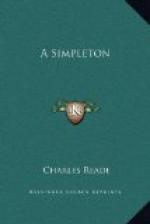“Dick!” cried Phoebe, in no little agitation. “Come here this minute.”
“What, afore I get the horses ashore?”
“Ay, before you do another thing, or say another word. Come here, now.” So he came, and she told him to take a good look at the man. “Now,” said she, “who is that?”
“Blest if I know,” said he.
“What, not know the man who saved your own life! Oh, Dick, what are your eyes worth?”
This discourse brought the few persons within hearing into one band of excited starers.
Dick took a good look, and said, “I’m blest if I don’t, though; it is the doctor that cut my throat.”
This strange statement drew forth quite a shout of ejaculations.
“Oh, better breathe through a slit than not at all,” said Dick. “Saved my life with that cut, he did, didn’t he, Pheeb?”
“That he did, Dick. Dear heart, I hardly know whether I am in my senses or not, seeing him a-looking so blank. You try him.”
Dick came forward. “Sure you remember me, sir. Dick Dale. You cut my throat, and saved my life.”
“Cut your throat! why, that would kill you.”
“Not the way you done it. Well, sir, you ain’t the man you was, that is clear; but you was a good friend to me, and there’s my hand.”
“Thank you, Dick,” said Staines, and took his hand. “I don’t remember you. Perhaps you are one of the past. The past is dead wall to me—a dark dead wall,” and he put his hands to his head with a look of distress.
Everybody there now suspected the truth, and some pointed mysteriously to their own heads.
Phoebe whispered an inquiry to the sick person.
He said a little pettishly, “All I know is, he is the kindest attendant in the ward, and very attentive.”
“Oh, then, he is in the public hospital.”
“Of course he is.”
The invalid, with the selfishness of his class, then begged Staines to take him out of all this bustle down to the beach. Staines complied at once, with the utmost meekness, and said, “Good-by, old friends; forgive me for not remembering you. It is my great affliction that the past is gone from me—gone, gone.” And he went sadly away, drawing his sick charge like a patient mule.
Phoebe Falcon looked after him, and began to cry.
“Nay, nay, Phoebe,” said Dick; “don’t ye take on about it.”
“I wonder at you,” sobbed Phoebe. “Good people, I’m fonder of my brother than he is of himself, it seems; for I can’t take it so easy. Well, the world is full of trouble. Let us do what we are here for. But I shall pray for the poor soul every night, that his mind may be given back to him.”
So then she bustled, and gave herself to getting the cattle on shore, and the things put on board her wagon.
But when this was done, she said to her brother, “Dick, I did not think anything on earth could take my heart off the cattle and the things we have got from home; but I can’t leave this without going to the hospital about our poor dear doctor: and it is late for making a start, any way—and you mustn’t forget the newspapers for Reginald—he is so fond of them—and you must contrive to have one sent out regular after this, and I’ll go to the hospital.”




